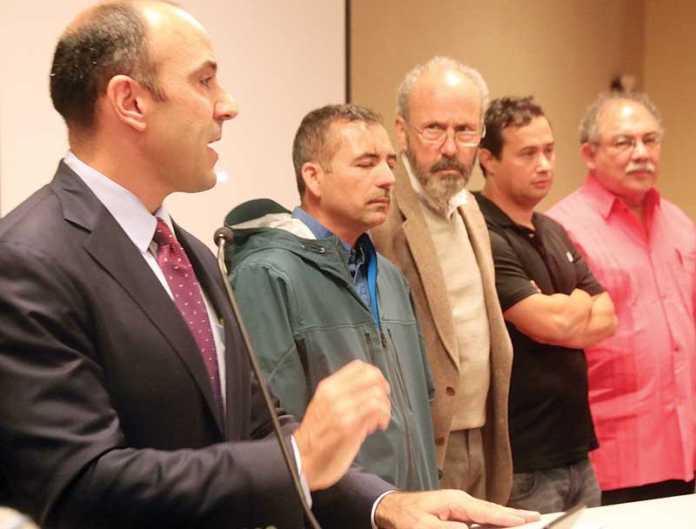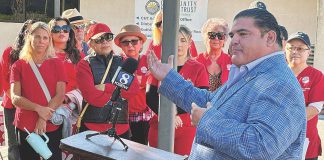WATSONVILLE — On Jan. 13, 2001, a 7.8-magnitude earthquake hit El Salvador, devastating the Central American country.
Almost 1,000 people were killed and more than 5,500 were injured. Hundreds of buildings were damaged and aftershocks continued to hit the region for weeks after.
This natural disaster resulted in an influx of immigrants from the country — many ending up in the United States. In March 2001, the U.S. designated El Salvador for the Temporary Protected Status (TPS) program, which grants certain nations temporary immigration status under federal law.
On Monday, the Trump administration is expected to announce whether or not it will extend the designation of El Salvador for another 18 months.
In response to the upcoming decision, Congressman Jimmy Panetta spoke at the Watsonville Civic Plaza’s Community Room on Friday, holding a press conference to address the issue and draw attention to the 200,000 Salvadorans who currently reside in the U.S. They are by far the largest group of TPS recipients, with 46,000 of them in California.
“This is an extremely important issue, not just here in California but the entire country,” Panetta said. “These people don’t just work to stay here, they work to contribute. They are embedded in our community. They and their families deserve to stay here.”
TPS was created in 1990 to exempt immigrants from being deported due to natural disasters or human-made conflicts that made their home countries unstable and unsafe. To be eligible for TPS, one must continue to reside in the U.S. and not be convicted of any sort of felony, or more than two misdemeanors. Recipients must file applications at particular times every 18 months.
In addition to Panetta, former Watsonville Mayor and current City Councilman Oscar Rios spoke to the crowd on Friday, as well as Doug Keegan of the Santa Cruz County Immigration Project. Keegan took the chance to try and get information out to those who are currently in the TPS program.
Keegan explained how a fee waiver is available for certain TPS recipients. The cost for re-applying is $495, which Keegan said might deter or even prevent many from the process.
Additionally, there is a federal court decision that, according to Keegan, states you can apply for residency for a number of reasons, such as if you are married to a U.S. citizen or have a child over the age of 21.
A handful of TPS recipients from El Salvador were also on hand at Friday’s press conference.
Tomas Escobar, who first acquired temporary status in 2001, gave his own testimony about how the program has helped him and his family. It has given him the opportunity to open a bank account, get a driver’s license and buy his own home, Escobar said.
He said what he is most worried about if TPS gets cut is how it will affect his two daughters.
“This is the only country they know,” he said.
In November, the Department of Homeland Security (DHS) ended TPS for 60,000 Haitians who fled Haiti after the earthquake in 2010. DHS Secretary Kirstjen Nielsen is expected to announce a similar decision for Salvadorans, but the fact they have been in the U.S. for so long might change things — or at least invoke a bigger pushback.
“There is a lot of rhetoric coming out of the White House right now,” Panetta said. “They’re making these people into political pawns. But this is about real people. Despite what happens on Monday, we need continue to go on fighting for them.”













